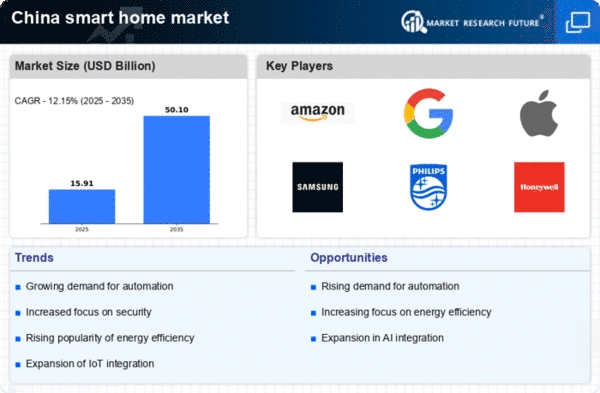Rising Urbanization
The rapid urbanization in China is a pivotal driver for the smart home market. As more individuals migrate to urban areas, the demand for efficient living solutions increases. Urban dwellers often seek convenience and security, which smart home technologies can provide. In 2025, urbanization in China is projected to reach approximately 65%, leading to a heightened interest in smart home solutions. This trend indicates that as cities expand, the integration of smart technologies into residential spaces becomes essential. The smart home market is likely to benefit from this demographic shift, as urban residents prioritize modern amenities that enhance their quality of life.
Focus on Home Security
The heightened focus on home security is a significant driver for the smart home market in China. With rising concerns about safety and property protection, consumers are increasingly investing in smart security systems. In 2025, the market for smart security devices is projected to grow by over 30%, reflecting a strong consumer preference for advanced security solutions. These systems often include features such as remote monitoring, smart locks, and integrated alarm systems, which provide peace of mind to homeowners. As security concerns continue to influence purchasing decisions, the smart home market is expected to expand, driven by innovations in security technology.
Government Initiatives
Government initiatives aimed at promoting smart technologies are significantly influencing the smart home market in China. Policies encouraging energy efficiency and sustainable living are fostering an environment conducive to the adoption of smart home solutions. In 2025, the Chinese government is expected to invest heavily in smart city projects, which will likely include smart home technologies. This investment may lead to increased consumer awareness and acceptance of smart home products. As a result, the smart home market could experience accelerated growth, driven by supportive regulatory frameworks and financial incentives for consumers.
Technological Advancements
Technological advancements play a crucial role in shaping the smart home market in China. Innovations in Internet of Things (IoT) devices, artificial intelligence (AI), and machine learning are driving the development of smarter, more interconnected home systems. In 2025, the market for IoT devices in China is expected to surpass $100 billion, reflecting a growing consumer appetite for advanced home automation solutions. These technologies not only improve user experience but also enhance energy efficiency and security. As manufacturers continue to innovate, the smart home market is likely to expand, offering consumers a wider array of products and services.
Consumer Demand for Convenience
The growing consumer demand for convenience is a notable driver of the smart home market in China. As lifestyles become increasingly fast-paced, individuals are seeking solutions that simplify daily tasks. Smart home technologies, such as automated lighting, smart thermostats, and remote security systems, cater to this need for convenience. In 2025, surveys indicate that over 70% of Chinese consumers express interest in smart home products that enhance their daily routines. This trend suggests that as consumers prioritize ease of use and time-saving solutions, the smart home market will likely see a surge in product adoption and innovation.
















